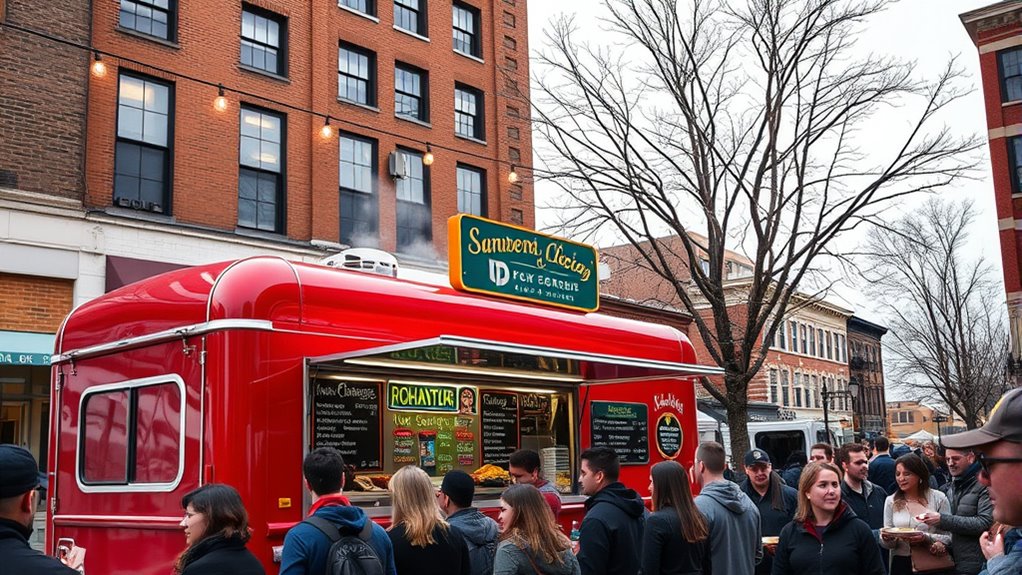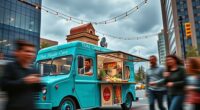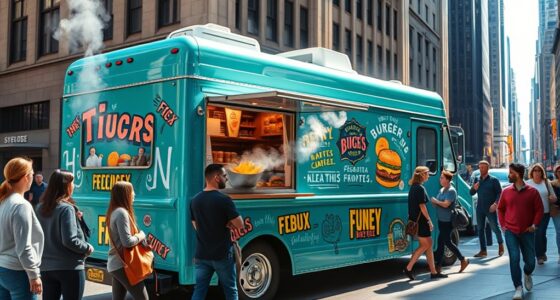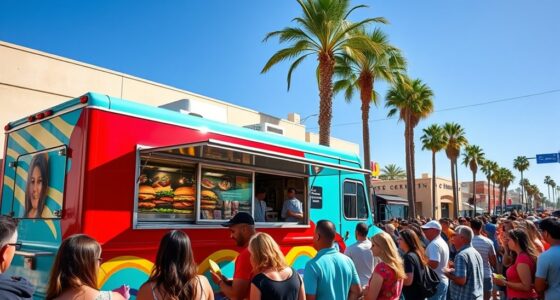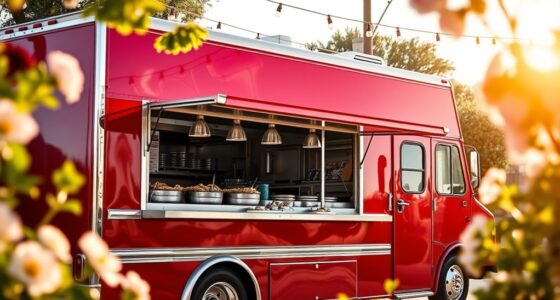To start a food truck in Rochester, NY, you need to understand local rules, get the right permits, and choose an efficient kitchen setup. Develop a tasty menu with competitive prices, source ingredients locally, and use social media to boost your presence. Engage with the community through events and collaborations, and stay compliant with health standards. Want to build a successful food truck business? Keep exploring for more helpful tips and strategies.
Key Takeaways
- Research Rochester’s local food truck permits, zoning laws, and regulations through the city’s official website.
- Secure startup capital via loans, grants, or partnerships, considering vehicle costs, branding, and inventory.
- Obtain necessary insurance coverage, including general liability, vehicle, and workers’ compensation policies.
- Develop a menu using local ingredients, balancing quality and cost to set competitive prices.
- Build community presence by participating in local events, festivals, and collaborating with Rochester businesses.
Navigating Rochester’s Food Scene

Rochester’s food scene offers a diverse mix of culinary options that can help your food truck stand out. To do this, focus on strong food truck branding that captures attention and communicates your unique flavor. Use eye-catching signage, creative logos, and consistent themes to build recognition. Social media marketing plays an essential role in reaching local audiences; showcase your daily specials, behind-the-scenes moments, and customer favorites to generate buzz. Engage with followers by responding to comments and encouraging reviews. Attend popular events and collaborate with local businesses to increase visibility. Incorporating visual branding elements such as color schemes and signage can further enhance recognition. By combining effective branding with active social media efforts, you’ll attract loyal customers and carve out a distinct niche in Rochester’s vibrant food scene.
Understanding Local Requirements
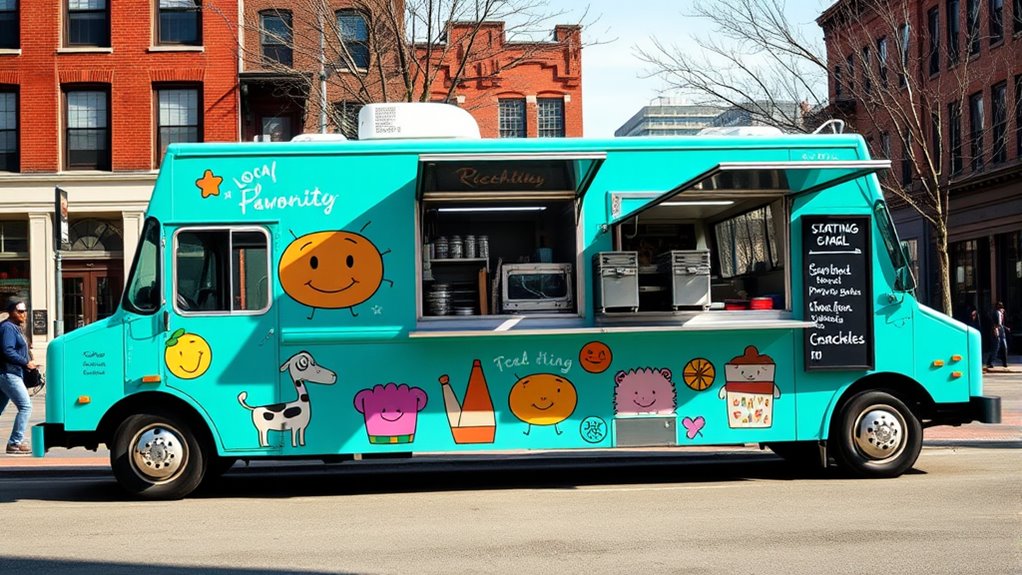
To get started, you’ll need to complete the online permit application through Rochester’s official channels. Make sure you comprehend the local sanitation standards to avoid violations that could delay your launch. Additionally, familiarize yourself with designated street parking zones to ensure your truck operates legally and efficiently. Being aware of expiration of vape juice can also be useful if you plan to offer beverages or related products that require freshness considerations.
Online Permit Application Process
Guiding the online permit application process in Rochester, NY, is a straightforward way to get your food truck business up and running. You can submit your digital application directly through the city’s portal, saving time and avoiding in-person visits. Make sure to gather all necessary documents beforehand, such as proof of insurance and vehicle registration. The online permit process is designed to streamline approval, but you’ll still need to meet local requirements. Here’s a quick overview:
| Step | Description |
|---|---|
| Submit | Complete the digital application online |
| Review | City reviews your submission promptly |
| Pay | Pay the permit fee online |
| Approval | Receive your online permit once approved |
This efficient system simplifies starting your food truck in Rochester.
Sanitation Standards and Violations
After completing your online permit application, it’s important to understand the sanitation standards you must meet to operate legally and safely in Rochester. You need to follow strict cleaning protocols to prevent sanitation violations that could jeopardize your license. Regularly sanitize food prep surfaces, utensils, and equipment to eliminate bacteria and other contaminants. The health department conducts inspections to ensure compliance, and violations such as improper waste disposal or unclean surfaces can result in fines or permit suspension. Keep detailed records of your cleaning routines and schedule routine deep cleans to maintain high standards. Staying proactive about sanitation not only keeps you compliant but also ensures customer safety and confidence in your food truck business.
Designated Street Parking Zones
Understanding the designated street parking zones in Rochester is essential for legally operating your food truck. These zones are regulated by local parking regulations and zone enforcement to prevent violations. You must identify where parking is permitted and avoid restricted areas. Rochester designates specific zones for commercial vehicles, often marked with signage or painted lines. Here’s a quick overview:
| Zone Type | Allowed Hours | Restrictions |
|---|---|---|
| Commercial Zone | 8 AM – 6 PM | No parking during street cleaning |
| Residential Zone | 9 AM – 5 PM | Limited to 2 hours |
| Downtown Zone | 7 AM – 9 PM | No parking during special events |
Adhering to these rules ensures smooth zone enforcement and compliance with parking regulations.
Setting Up Your Base of Operations

Choosing the right space to run your food truck is essential, and shared kitchen licenses can offer a flexible option. Planning your kitchen layout carefully guarantees you meet health codes and operate efficiently. Let’s explore how to select a suitable shared kitchen and design a layout that works best for your menu and workflow. Incorporating proper kitchen layout strategies can also help streamline your juice preparation processes and ensure safety standards are maintained.
Shared Kitchen Licensing Options
Setting up your food truck often starts with finding a suitable shared kitchen, which can be a cost-effective way to meet health department requirements and streamline your operations. Shared kitchen licensing options vary, but they’re essential for legal operation. You’ll need to secure cooperative kitchen permits that allow multiple vendors to use the space legally. Here are key considerations:
- Verify shared kitchen licensing compliance with local health authorities.
- Check if the facility holds valid cooperative kitchen permits.
- Understand the specific licensing requirements for your type of cuisine.
- Ensure the shared kitchen meets all safety and sanitation standards.
Choosing the right shared kitchen simplifies your licensing process and reduces startup costs, helping you get your Rochester food truck up and running smoothly.
Custom Kitchen Layout Planning
When designing your food truck’s kitchen layout, it’s essential to optimize space for efficiency and safety. A well-planned layout improves your kitchen workflow and ensures smooth operations. Start by placing appliances strategically: the refrigerator should be near prep stations, while cooking equipment like grills and fryers need clear ventilation. Consider the flow of movement—workstations should be arranged to minimize unnecessary steps and prevent cross-contamination. Use this table as a mental map:
| Area | Key Features |
|---|---|
| Prep Station | Counter space close to fridge |
| Cooking Zone | Grills, fryers with ventilation |
| Storage | Under-counter and overhead shelves |
| Service Window | Easy access for serving |
This setup helps streamline your kitchen workflow, making your food truck efficient and safe.
Budgeting and Financing Your Food Truck
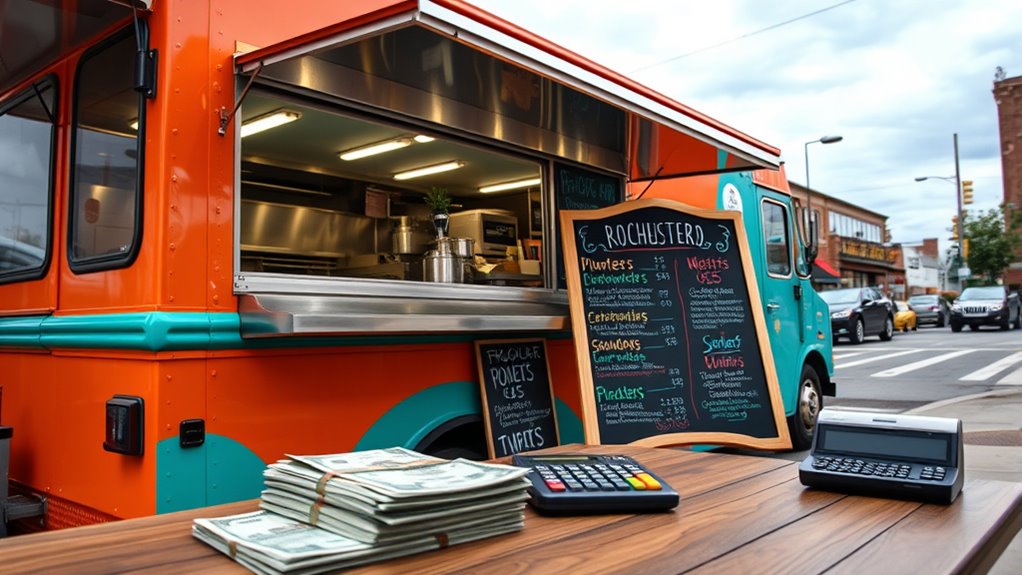
To get your food truck rolling, you need to understand your initial vehicle costs and explore different funding options. It’s also important to think about extensive insurance plans to protect your investment. By planning your budget carefully, you’ll set a solid foundation for your Rochester food truck business. Considering investment assets such as equipment and inventory can further optimize your financial planning.
Initial Vehicle Purchase Costs
Purchasing your food truck is a significant upfront expense that requires careful budgeting and financing. The initial vehicle costs can vary greatly based on the truck’s size, condition, and customization needs. Here are four key factors to contemplate:
- Base Price: New trucks can cost $50,000–$100,000, while used vehicles may be more affordable but require thorough inspections.
- Customization & Equipment: Budget for kitchen appliances, signage, and interior modifications.
- Vehicle Maintenance: Plan for ongoing vehicle maintenance costs to keep your truck reliable.
- Financing Options: Explore loans, leasing, or rental options to manage cash flow effectively.
Understanding these costs helps you plan your budget and choose financing options that align with your business goals.
Startup Capital Sources Exploration
Securing the right startup capital is essential to turning your food truck dreams into reality. You’ll need funds not only for vehicle costs but also for food truck branding, marketing, and initial inventory. Explore various sources like personal savings, bank loans, or small business grants available in Rochester, NY. Consider partnerships or investors who believe in your concept and can boost customer loyalty from day one. Crowdfunding platforms can also be effective, especially if you have a compelling story and plan to build a strong brand presence. Be thorough in your budgeting, accounting for unexpected expenses. Having a clear financial plan will help you attract the right funding and set a solid foundation for your food truck business.
Comprehensive Insurance Policy Options
A thorough insurance policy is an essential component of budgeting and financing your food truck venture. It helps protect your investment and guarantees smooth operations. Here are four key policy types to keep in mind:
- General Liability Insurance – covers accidents, injuries, and property damage.
- Vehicle Insurance – protects your truck against theft, vandalism, and accidents.
- Commercial Property Insurance – safeguards equipment, inventory, and supplies inside your truck.
- Workers’ Compensation – covers employee injuries on the job.
Designing Your Menu and Pricing Strategy
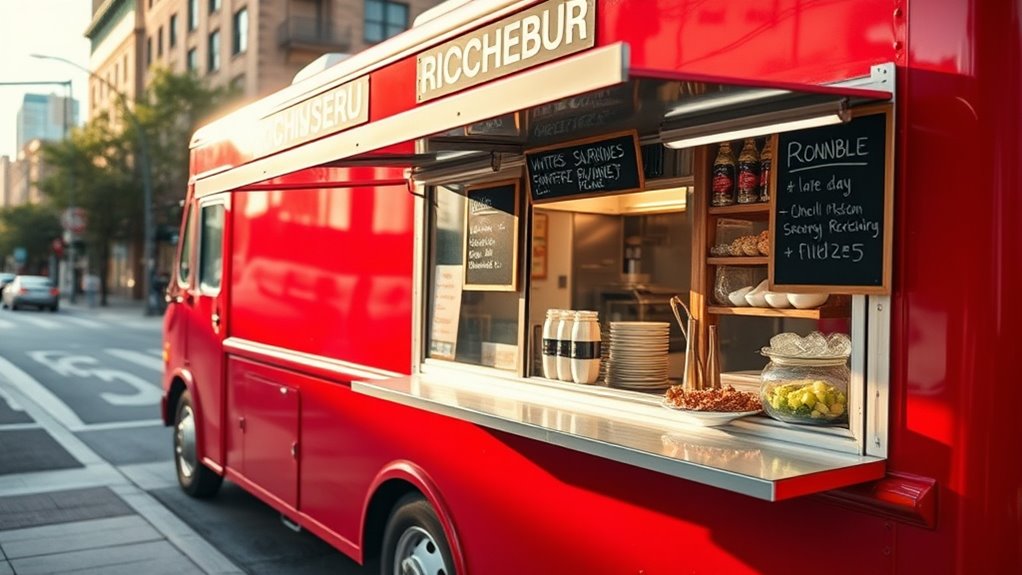
When designing your menu, consider using locally sourced ingredients to appeal to community pride and guarantee freshness. Balancing quality with cost control strategies helps you set prices that attract customers while maintaining profit margins. By focusing on these points, you can create a menu that’s both appealing and sustainable for your Rochester food truck. Incorporating ingredients with anti-aging effects can also enhance the perceived value of your offerings.
Locally Sourced Ingredient Sourcing
In Rochester’s vibrant food scene, sourcing ingredients locally not only supports nearby farms but also allows you to craft a menu that highlights fresh, seasonal flavors. Building strong sourcing partnerships ensures ingredient freshness and consistency. To maximize your impact, focus on these key strategies:
- Develop relationships with local farmers and vendors for reliable ingredient access.
- Prioritize seasonal produce to keep your menu innovative and fresh.
- Negotiate directly to get the best prices and quality.
- Regularly visit markets and farms to stay updated on new offerings.
Cost Control Strategies
Designing your menu and pricing strategy requires a careful balance between offering appealing dishes and maintaining profitability. To achieve this, focus on cost reduction by selecting ingredients that are both high quality and budget-friendly. Streamlining your menu helps control expenses and prevents waste, making expense management easier. Price your items strategically to cover costs while remaining competitive in Rochester’s food truck scene. Use portion control to minimize waste and optimize ingredient use, boosting profit margins. Regularly analyze sales data to identify popular dishes and adjust pricing accordingly. Avoid overcomplicating your menu, which can increase preparation time and waste. By aligning your menu design with your expense management goals, you ensure your food truck stays profitable and sustainable long-term.
Technology and Operations
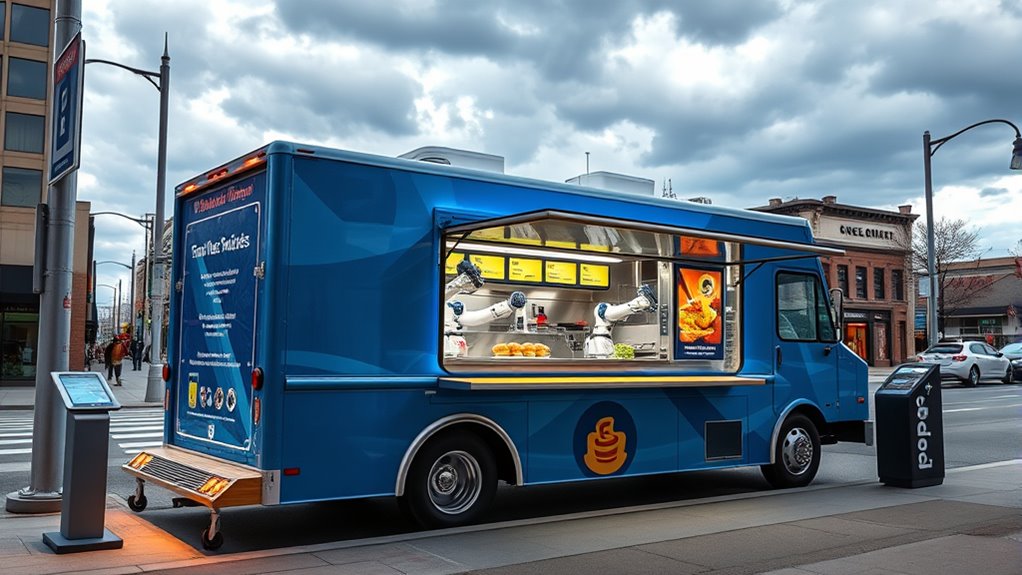
To keep your food truck running smoothly, you’ll want to choose a mobile payment app that works seamlessly with your system. Implementing a real-time stock tracking system helps you monitor inventory and avoid shortages. These tools streamline operations, so you can focus on serving great food to your customers.
Mobile Payment App Compatibility
Choosing the right mobile payment app is essential for smooth operations on your food truck, as customers increasingly prefer cashless payments. Ensuring your system is compatible with popular mobile payment apps makes transactions faster and more convenient. Here are four key considerations:
- Compatibility with major apps like Apple Pay, Google Pay, and Samsung Pay
- Ease of integration with your existing POS system
- Security features to protect customer data during cashless payments
- Low transaction fees to maximize profits
Real-Time Stock Tracking System
Implementing a real-time stock tracking system is essential for maintaining efficient operations and meeting customer demand on your food truck. With accurate inventory management, you can monitor stock levels instantly, preventing shortages or overstocking. This system helps you identify popular ingredients and adjust your purchasing accordingly. By streamlining inventory data, you strengthen supplier relationships, ensuring timely deliveries and better negotiation power. Real-time tracking reduces waste and minimizes delays, keeping your menu consistent and fresh. It also allows you to forecast future needs based on sales trends, optimizing your stock levels. Ultimately, this technology enhances operational efficiency, saves money, and improves customer satisfaction—key elements to building a successful food truck business in Rochester, NY.
Marketing and Growing Your Presence
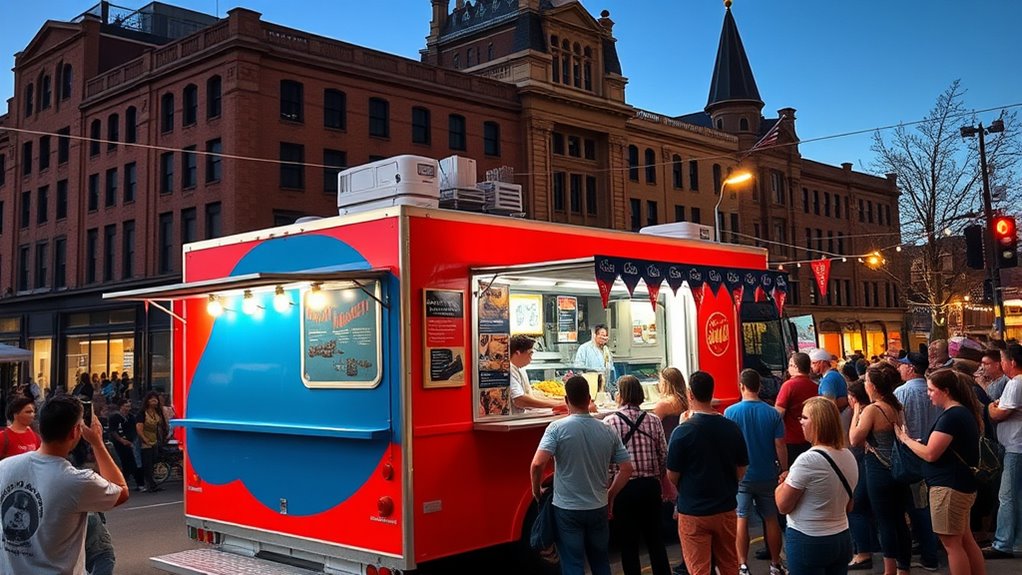
To grow your food truck’s presence, focus on scheduling your appearances at popular local events when foot traffic is highest. You should also connect with foodie influencers in Rochester who can showcase your offerings to a wider audience. These strategies can boost visibility and attract new customers to your truck.
Popular Event Scheduling Tips
Scheduling your food truck events strategically can remarkably boost your visibility and customer base. To maximize your reach, consider these tips:
- Align your schedule with popular food truck festivals in Rochester to attract large crowds and build recognition.
- Plan your events during peak hours and weekends when more potential customers are available.
- Incorporate seasonal menu planning to keep offerings fresh and relevant, encouraging repeat visits.
- Rotate locations and event types to diversify your audience and avoid market saturation.
Engaging Foodie Influencers
Have you considered partnering with foodie influencers to elevate your food truck’s visibility? Influencer collaborations can boost your brand through authentic food photography and reach a wider audience. When you engage influencers, they share eye-catching images of your dishes, making your food irresistible. To maximize impact, choose influencers whose followers match your target market.
| Benefits of Influencer Collaborations | Tips for Success |
|---|---|
| Increased exposure | Offer free samples for genuine reviews |
| Authentic content creation | Encourage high-quality food photography |
| Access to niche audiences | Build long-term relationships |
Local Networking Opportunities Boost Success

Building strong local connections can considerably boost your food truck’s success in Rochester. By engaging in community collaborations and participating in local culinary festivals, you’ll increase your visibility and customer base. These opportunities help establish your reputation and foster meaningful relationships. To maximize your networking efforts, consider these strategies:
- Partner with local businesses for cross-promotions
- Join food truck associations and attend meetups
- Volunteer at community events to build goodwill
- Participate in popular local culinary festivals to showcase your menu
These activities not only boost your profile but also create valuable connections that can lead to repeat customers and collaborative opportunities. Embracing Rochester’s vibrant food scene through networking will give your food truck a competitive edge.
Frequently Asked Questions
What Are the Best Locations for Food Trucks in Rochester?
You should park your food truck at popular food spots like the Public Market and Highland Park, where foot traffic is high. Check out designated food truck parking zones downtown and near college campuses, as these areas attract crowds looking for quick bites. By targeting these busy locations, you’ll maximize visibility and sales, ensuring your food truck becomes a local favorite in Rochester.
How Do Rochester’s Health Inspections Differ From Other Cities?
Rochester’s health inspection standards emphasize strict adherence to food safety regulations, ensuring your truck maintains cleanliness and proper food handling practices. Unlike some cities, Rochester conducts more frequent inspections and reviews detailed records, making compliance essential. You must follow local guidelines closely, prioritize sanitation, and train staff accordingly. Staying proactive with these standards helps you pass inspections smoothly and build trust with your customers, ultimately boosting your food truck’s success.
Are There Any Specific Rochester Food Truck Festivals or Events?
You’ll find Rochester hosts lively food truck competitions and vibrant local food festivals that celebrate diverse flavors. These events showcase your culinary skills and attract food lovers from all around. Unlike typical festivals, Rochester’s gatherings emphasize community spirit and local talent. Participating in these festivals helps you stand out, turn your passion into profit, and connect with a supportive community that cherishes unique, tasty experiences on wheels.
What Permits Are Required for Outdoor Catering in Rochester?
To operate your food truck for outdoor catering in Rochester, you need to obtain food truck licensing and meet outdoor catering regulations. You’ll also need a vendor’s license and health department permits, which make certain your truck complies with safety standards. Check with the Rochester City Department of Environmental Services for specific requirements, and make sure to pass health inspections and secure any necessary zoning approvals before serving customers.
How Does Rochester’s Weather Impact Food Truck Operations Year-Round?
Rochester’s weather can feel like a rollercoaster, transforming your food truck operations into an extreme sport! You’ll battle freezing winters that demand a winterized vehicle, and sweltering summers that require a cooling system. Prepare for snowstorms and summer heatwaves that challenge your seasonal menu and demand rigorous vehicle maintenance. Embrace the chaos, adapt fast, and keep your truck running smoothly through Rochester’s wild weather swings!
Conclusion
Starting a food truck in Rochester is like planting a seed in rich soil—you’ll need to nurture it with passion, adapt to the climate, and stay persistent. With the right tools, local connections, and a clear vision, your truck can blossom into a vibrant part of Rochester’s bustling food scene. Keep your roots strong, stay flexible, and watch your culinary journey grow into a thriving, flavorful garden.
